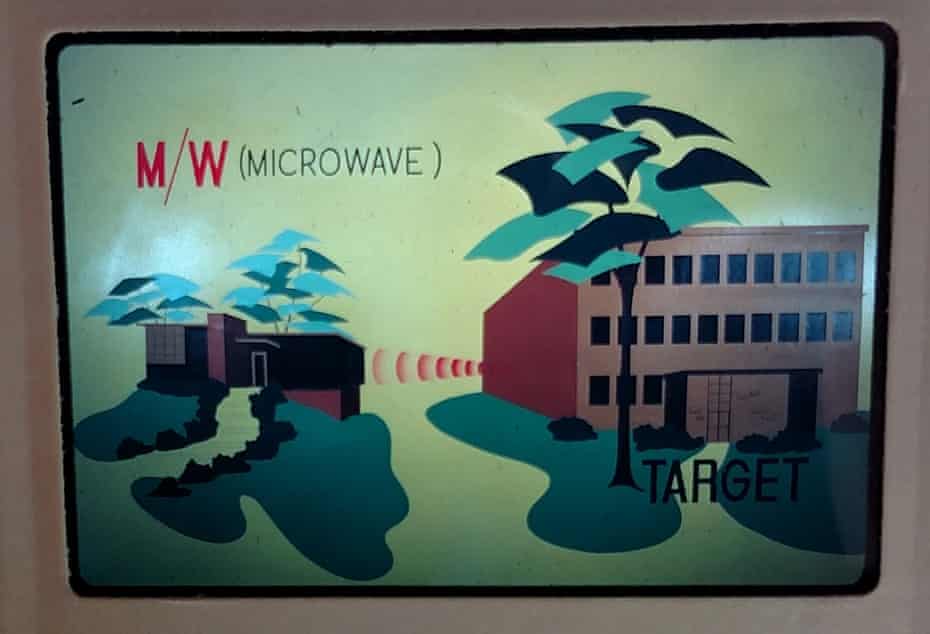Julian Borger

Portable microwave weapons capable of causing the mysterious spate of “Havana Syndrome” brain injuries in US diplomats and spies have been developed by several countries in recent years, according to leading American experts in the field.
A US company also made the prototype of such a weapon for the marine corps in 2004. The weapon, codenamed Medusa, was intended to be small enough to fit in a car, and cause a “temporarily incapacitating effect” but “with a low probability of fatality or permanent injury”.
There is no evidence that the research was taken beyond the prototype phase, and a report on that stage has been removed from a US navy website. Scientists with knowledge of the project said that ethical considerations preventing human experimentation contributed to the project being shelved – but they said such consideration had not hindered US adversaries, including Russia, and possibly China.
“The state of that science has for the most part been, if not abandoned, pretty much left fallow in the United States – but it has not been fallow elsewhere,” said James Giordano, professor of neurology and ethics at Georgetown University Medical Center.
Giordano, who is also senior fellow in biotechnology, biosecurity and ethics at the US Naval War College, was brought in as adviser by the government in late 2016 after about two dozen US diplomats began falling sick in Havana. He later took part in an assessment for US Special Forces Command on which countries were developing the technology and what they had achieved.
“It became clear that some of the work that was conducted in the former Soviet Union was taken up again by Russia and its satellite proxies,” Giordano said, adding that China had also developed directed energy devices to test the structure of various materials, with technology which could be adapted to weapons. A second major wave of brain injuries among US diplomats and intelligence officers took place in China in 2018.
Giordano is restricted from giving details on which country had developed what kind of device but he said the new weapons used microwave frequencies, able to disrupt brain function without any burning sensation.
“This was important – and rather frightening – to us, because it represented a state of advancement and sophistication of these types of instruments that heretofore had not been thought to be accomplished,” he said.
If a US adversary has succeeded in miniaturising the directed energy technology needed to inflict tissue damage from a distance, it makes such weapons a more plausible explanation for Havana Syndrome.
More than 130 US officials, from the state department, CIA and national security council (NSC), have suffered from symptoms, including dizziness, loss of balance, nausea and headaches, first identified in Cuba. The impact on some of the victims has been debilitating and long-lasting.
Some of the most recent incidents have involved NSC officials experiencing crippling symptoms in broad daylight in Washington. The state department, CIA and Pentagon have all launched investigations, but have yet to come to conclusions. A National Academy of Sciences report in December, found that the Havana Syndrome injuries were most likely caused by “directed pulsed radio frequency energy”.
Sceptics of the microwave weapon theory have pointed to decades of US efforts to build such a device during the cold war and since, without any confirmed success. They have also argued that a weapon capable of inflicting brain injury from a distance would be too unwieldy to use in urban areas.
However, James Lin, the leading US authority on the biological impact of microwave energy, said a large apparatus would not be needed to focus energy on a small area, heating it a minute amount and causing “a thermoelastic pressure wave” that travels through the brain, causing damage to soft tissue.
The pressure wave would initially be experienced by the target as sound. Many of the US diplomats, spies, soldiers and officials whose symptoms are being studied as part of the Havana Syndrome investigation reported hearing strange sounds at the onset of the attacks.
“You can certainly put together a system in a couple of big suitcases that will allow you to put it in a van or an SUV,” Lin, professor emeritus in the electrical and computer engineering department at the University of Illinois, said. “It’s not something that you need to have enormous amounts of space or equipment to do it.”
 Unexplained illnesses were first discovered among US diplomats in Havana in 2016. Photograph: Diego Grandi/Alamy Stock Photo
Unexplained illnesses were first discovered among US diplomats in Havana in 2016. Photograph: Diego Grandi/Alamy Stock PhotoThe microwave weapon project for the US Marine Corps, first reported in Wired, was first developed by a company called WaveBand Corporation. Codenamed Medusa – a contrived acronym for Mob Excess Deterrent Using Silent Audio – the weapon used the same technology as that suggested by Professor Lin, the “microwave audio effect”, which created rapid microwave pulses that slightly heated soft tissue in the brain, causing a shockwave inside the skull.
WaveBand was given $100,000 for the prototype, which according to the specifications of the contract would “be portable, require low power, have a controllable radius of coverage, be able to switch from crowd to individual coverage, cause a temporarily incapacitating effect, have a low probability of fatality or permanent injury, cause no damage to property, and have a low probability of affecting friendly personnel”.
A navy document in 2004 (which has since been removed from the Navy Small Business Innovation Research site) said the hardware had been designed and built. “Power measurements were taken and the required pulse parameters confirmed,” it said. The document added: “Experimental evidence of MAE [microwave auditory effect] was observed.”
WaveBand’s former president and CEO, Lev Sadovnik, said he was limited in what he was allowed to say about the project, but said the immediate effects of MAE were disorientation and the impression of hearing sounds.
Sadovnik said that a device capable of causing Havana Syndrome symptoms could be relatively portable.
“It’s quite conceivable that you can hide it in a car, or in a van but it would not work over a long distance,” he said. “You can do it through a wall, say, if you are in the next room in a hotel.”
Sadovnik said the Medusa prototype was not powerful enough to cause lasting harm, nor would that be allowed. But he said Russia was more advanced in understanding the human impact of microwave weapons – partly because it did not face the same ethical constraints.
“We have here very strict limitations, of course, on human tests and animal testing,” he said. “The Russians do not adhere to these standards.”
Giordano said that different political and ethical norms in Russia and China, create “unique opportunities to advance bioscientific and technological development in ways that would be untenable in the United States and programs of our Nato allies”.
Although many US officials and victims believe that Russia is behind the attacks, there is so far no compelling evidence that Moscow is responsible. In some cases, Russian military intelligence (GRU) vehicles are reported to have been close to the scene of an apparent attack. But it would not be unusual for the GRU to tail US officials.
The Russians certainly had a long history of using microwave technology against US diplomatic missions. The embassy in Moscow was found to be bathed in microwave radiation in the 1960s and early 1970s, though the intention behind it was never clear. That episode erupted into a scandal when it emerged the US government had withheld the fact from its own diplomats.
At the same time, the US was spending huge amounts trying to develop its own directed energy weapons, both laser- and microwave-based. Mark Zaid, a lawyer representing some of the Havana Syndrome victims, has a CIA briefing slide appearing to date from the 1960s or 1970s which shows a building being hit by microwaves from a nextdoor structure. Zaid said the slide was among the personal effects left by a deceased agency officer.
 Tourists ride classic convertible cars on the Malecón beside the US embassy in Havana, Cuba. Photograph: Desmond Boylan/AP
Tourists ride classic convertible cars on the Malecón beside the US embassy in Havana, Cuba. Photograph: Desmond Boylan/AP“The military loves death rays. Everybody loves death rays – and lasers had some of the characteristics of death rays so people kind of got excited about that,” recalled Cheryl Rofer, who worked on laser and auditory weapon research in the 1970s at Los Alamos National Laboratory in New Mexico.
That auditory research eventually led to the Long Range Acoustic Device, or “sound cannon”, used by some police forces against demonstrators last summer. But it did not lead to any “death rays”.
“Thinking about something and actually building it are two different things,” Rofer said. And the experience of seeing billions spent over the decades with little to show for it, has left her sceptical about new claims of microwave weapons development.
“The military has a whole lot of money sloshing around, and they will try lots of different things, and some of them are good and some of them are not so good.”
Giordano said, however, that while development had stalled in the US, it had been continued by America’s adversaries. The initial two dozen cases in Havana, he said, represented a field test of the equipment.
He said that while the US focuses on expensive weapons for traditional warfare, Russia, China and others are “very interested in, and dedicated to, developing non-kinetic tools that can be leveraged below the threshold of what would formally be considered acts of war, so as to engage in processes of mass disruption”.
No comments:
Post a Comment